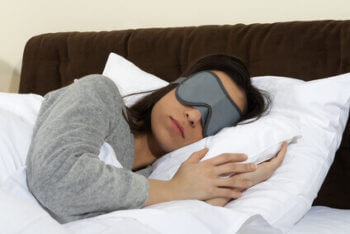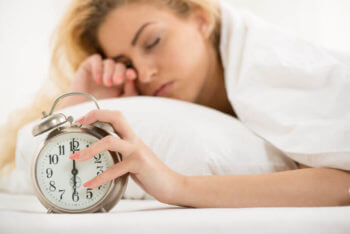Are you one of the countless individuals who struggle to achieve and maintain a healthy, regular sleeping pattern? With a phenomenal rise in handheld electronic devices, combined with a rise in unusual and unconventional working hours around the world, the task of getting to sleep at night has become a serious challenge for many of us.
The phrase ‘sleep hygiene’ is relatively new, but the concept itself is certainly not. It simply refers to the range of techniques that you can use to ensure a healthy sleeping pattern. These can include managing your screen time, eating right during the day, eliminating sources of light, and much more.
In this Essential Guide To Sleep Hygiene, I’m going to explain everything you need to know about controlling and normalizing your bedtime routines and sleeping pattern. Do you think you’re already doing all you can? Trust me, you’re not! There is a long list of helpful tips and tricks, and in this guide I’m going to explain every one of them. Read on, and get ready for the best sleep of your life!
Sections in this guide:
1. Manage your screen time
2. Create a relaxing environment
3. What you should (and shouldn’t) eat before bed
4. The importance of routine
5. Sleep-promoting habits during the day
6. Tips for restless sleepers
7. Are you getting enough sleep?
1. Manage your screen time
 Keep The TV Out Of The Bedroom
Keep The TV Out Of The Bedroom
The television is your worst enemy when it comes to trying to get to sleep. With hundreds of channels to surf on a twenty-four hour entertainment loop, there will always be something that you will be tempted to watch, no matter what time it is. The smart move is to completely rid yourself of this temptation by not having a television in your bedroom at all. This way, your brain will realize that all electronic stimulus has finished once you have entered the bedroom, and it is time for true rest.
Decrease Smartphone & Tablet Usage
In a similar vein, and arguably even worse, is the way in which your plans for sleep can be disturbed by the chime of a text message or buzz of a Facebook update. These days we are constantly plugged in to our smartphones and tablets, keeping a permanent eye on social networks or browsing news and entertainment websites. It can be hard to commit to turning off your phone at night, but disconnecting from your online life is an absolute necessity if you want to sleep well.
Switch All Devices Off At Least 30 Minutes Before Bed
Following on from this, I would highly recommend turning all entertainment and social networking devices off at least thirty minutes before you plan to go to bed. It has been shown that using screens before bedtime suppresses your body’s production of an important hormone named melatonin. This hormone, often known as the sleep hormone, plays a crucially important role in getting you to sleep and maintaining your Circadian rhythm.
If your devices are not turned off in time, your melatonin levels may well be disrupted. When you find yourself lying in bed, preoccupied and thinking about the days events, it is quite possibly your hormone levels that are stopping you from going to sleep.
Do Not Check Devices During The Night
If you cannot bring yourself to physically turn off your phone or tablet overnight, then the next best step is to commit to not checking your screens every time you wake up in the night. It has become second nature to roll over, look at the time, check your messages and emails, then try to go back to sleep. Exposure to a bright screen, even for a short period of time, can prevent you from going back to sleep.
If your phone has a ‘Do Not Disturb’ mode, make sure you use it. It will prevent your phone from ringing when people call or text you late at night. If you are using a modern smartphone, you don’t even need to worry about missing emergency calls. You can create a list of immediate family members (or anyone else who might call in an emergency) who will be able to call you. You can also set it up to ring only if someone calls you twice (i.e. if its really important!).
2. Create a relaxing environment
 Eliminate Sources Of Light
Eliminate Sources Of Light
The brain is an incredibly sensitive organ. Sometimes, even the most unassuming of factors can keep it from shutting down for the night and allowing you to sleep. The majority of people turn their bedroom lights off when they go to bed, but think about any other sources of light that you might be able to eliminate in your bedroom.
This can be anything from turning your appliances off at the mains rather than leaving them with standby lights on, or even investing in some heavier, darker curtains that will help to keep more of the light from the street out of your bedroom. Wearing a sleeping mask can also help.
Be As Comfortable As Possible
You would be surprised by just how long some people will put up with uncomfortable bedding. It is so vital that you find what is right for you personally. Elements to consider are the size and firmness of a mattress, the shape and firmness of pillows; the thickness and tog count of your duvet, and even the material that your sheets are made from. All of these together can make for either a perfect night’s sleep or hours of tossing and turning, depending on your preferences.
Adjust Temperature
The temperature of a room can often make a huge difference when it comes to your sleeping habits. Some prefer a colder bedroom so that they can feel the benefit of the warmth from underneath their duvets. Others like to have a warmer temperature so that they can still be comfortable when lying in bed without layers of blankets or quilts on top. This very much comes down to what kind of person you are, and whether you prefer the Summer months or Winter months. Regardless of your preference, the temperature of your bedroom is a factor that can be easily controlled and certainly should not be forgotten.
Reduce Noise
Most people prefer a quiet, calm atmosphere when trying to get to sleep. There are many ways you can actively reduce the amount of noise in your bedroom at night. These include making sure all of your devices are switched off and closing your windows to block out external noise. Another handy suggestion for reducing noise is to invest in a good, comfortable pair of earplugs. The soft, memory foam varieties are relatively inexpensive and will mould to the shape of your ears, helping to block out nearly all sound, allowing you to fully relax.
If there are some noises that you just can’t block out (like a partner’s snoring, for example), consider investing in a white noise generator. These helpful little devices can play white noise or simulate noises like waterfalls, ceiling fans or rainfall. You can also get free white noise generator apps on your iPhone or Android smartphone. Just remember to plug your phone in overnight, otherwise the app will run down the battery quite fast.
Set Boundaries For Bedroom Usage
With so many advances in entertainment and technology, many bedrooms have become multipurpose rooms much like lounges or an office. With computers, tablets and televisions to contend with, it is easy for the brain to categorize the bedroom as something that its really not. Try to set boundaries for bedroom usage; think of the space as only a place for sleep and sex. Once this routine is established you may find yourself drifting off too sleep much more quickly.
3. What you should (and shouldn’t) eat before bed
 Here is a list of sleep-promoting foods that you should consider eating before bedtime.
Here is a list of sleep-promoting foods that you should consider eating before bedtime.
- Cherries
Cherries are among a small group of natural foods that contain melatonin. Melatonin is a chemical that works to control and regulate your body’s internal clock, so a handful of the fruit a couple of hours before bedtime can help to regulate your sleeping pattern. - Milk
The old wives tale of having a warm glass of milk before bed has actually been proven to have real merit. Milk contains an amino acid called tryptophan, which is a precursor to the brain-produced chemical serotonin. Many experts believe that serotonin and tryptophan make it easier to sleep. - Bananas
Not only are bananas incredibly healthy, they also contain a natural muscle relaxant in their mixture of potassium and magnesium content. This combination, mixed with the carbohydrate content of the banana, is an effective way to promote sleep. - Turkey
Just think about it, don’t you always have a great afternoon nap after Thanksgiving or Christmas turkey? There is actually a scientific reason behind this as turkey, like milk, contains tryptophan. Try having a turkey dinner one evening to see if its effect takes hold.
And here is a short list of the foods that you should really avoid before bedtime.
- Alcohol
Alcohol in any of its forms is extremely detrimental to getting a well-rested night’s sleep. The reason for this is that it metabolizes very quickly in your system – that’s why you might find yourself waking up several times during the night. One study showed that women who had been drinking during the evening recorded up to twenty minutes less sleep. - Coffee
As we all know, coffee contains large amounts of caffeine, a major stimulant for the central nervous system. Caffeine elevates your levels of stress hormones like adrenaline and cortisol, in making it much harder for the body to rest. Research has shown that coffee can reduce the quality of your sleep even when taken six hours before bedtime. - Dark Chocolate
Though chocolate is often a go-to late night snack, dark chocolate in particular can be very disruptive in terms of sleep. Like coffee, it contains lots of caffeine and also contains theobromine, another stimulant that causes an increased heart rate, which can lead to sleeplessness. - Spicy Food
Foods containing a lot of spices are known to be a contributing factor to restless sleep. This can mean curry or indeed any dish that incorporates hot sauces like Tabasco or mustard. This is thought to be related to the heartburn-inducing properties that spicy foods have, leading to an uncomfortable period where sleep becomes highly unlikely.
4. The importance of routine
 Set & Commit To A Regular Alarm Time
Set & Commit To A Regular Alarm Time
Setting a morning alarm and sticking to it is an absolutely vital element of maintaining a settled and regular sleeping pattern. The worst thing you can do is hit the snooze button, then again, and again, and again, until you are running late and are forced to rush through your morning routine.
As a way of easing your way gently into the day, consider setting your alarm for twenty to thirty minutes before you actually have to get up. This way you can ease in to the morning without causing yourself too much distress. There are also specialized alarm clocks that wake you slowly using a combination of gradually increasing light and sound. This is a much more natural way to wake up, closely approximating the ‘wake at dawn’ mentality that our ancestors evolved with.
Set & Commit To A Regular Bed Time
Just as it is important to set a regular wake up time, it is equally important to commit and stick to a regular bedtime in the evening. Having an erratic, varied bedtime is one of the worst things you can do when you are training your brain to sleep. Keeping a regular schedule from sunrise to sunset is the best way to regulate your Circadian rhythm.
By committing to going to bed every night at, for example, 10:00pm, you are training your brain and hormone cycles to shut off at this specific time of night. This will help you to be more rested and less mentally active when trying to fall asleep.
Maintain A Regular Pre-Bedtime Routine
Another helpful way to attain a regular sleeping pattern is to maintain a consistent pre-bedtime routine. This may include taking a hot bath, doing some light reading, or simply your nightly beauty regime. When you do these things habitually, soon your body will come to recognize these actions as a prelude to going to bed. Effectively you are sending a signal to your body that it is almost time for sleep.
5. Sleep-promoting habits during the day
 Regular and moderate exercise
Regular and moderate exercise
Daily, moderate exercise is not just the best way of keeping healthy and in shape. It is also a great way to condition your body and mind for a successful night of sleep. All forms of exercise cause the body to expend energy. Moderate daily exercise is all about achieving an endorphin-producing workout without pushing yourself to exhaustion. Doing just enough exercise to feel the energy burn when bedtime comes around is the perfect way to promote a long night’s sleep.
Avoid caffeine six hours before bed
I have mentioned this previously but it bears repeating. If you are one of the many people who rely on copious amounts of coffee to make it through the day, then it may be time to seriously reconsider your beverage of choice. The strong stimulant affect that caffeine has is one of the worst enemies of a good night’s sleep, and can also contribute to adrenal fatigue. Having your final cup of the day even as early as 5 or 6pm can still seriously affect your sleep.
It is important to remember that caffeine is not only found in coffee but also in other household favorites such as fizzy cola drinks, dark chocolate, energy drinks and even tea. Stick to water, herbal teas or milk during the evening to achieve the best night’s rest possible.
Expose yourself to natural light
Getting a really good night’s sleep on a regular basis is all about the balance between light and dark. It is really important that you maintain a natural rhythm when it comes to light during the day and darkness during the night. Getting at least thirty to sixty minutes of time in the natural light of the day serves as an effective synchronizer for your daily hormone cycles. In order to anchor and stabilize this ‘master clock’, you should aim for lots of bright light exposure during the day, and total darkness in your bedroom at night. Blackout blinds or sleep masks can be a great way to achieve this.
Try not to nap (unless you really need to)
Depending on the state of your diet and your daily work schedule, it can sometimes be very tempting to take a nap during the day. If you’re aiming to get the best possible sleep at night, taking naps can sometimes be counter-productive.
Having said that, individuals with adrenal fatigue may benefit from taking an hour or so each afternoon to nap. If you find that your napping is not preventing you from getting a good sleep at night, then go for it.
6. Tips for restless sleepers
 Deep Breathing
Deep Breathing
As the minutes or hours tick by and you simply cannot get to sleep, one exercise that has been recommended by many experts is the practice of deep breathing. The idea is to close your eyes and take deep, slow breaths, trying to make each breath even deeper than the last one that you took.
This focusing of the mind on something other than the physical act of falling asleep is often all a person needs for their brain to begin to shut down and allow them to drift off. Think of it as a more involved version of counting sheep.
Progressive Muscle Relaxation
This is a low impact, full body exercise that can be done whilst lying in bed, and has been proven to be effective in encouraging the body to enter a more relaxed state (the relaxation response) that eventually turns to sleep.
Starting at the very tip of your toes, tense all of the muscles as tightly as you can and hold for up to ten seconds before completely relaxing again. Work your way from your feet all the way to the top of your head, hitting as many muscles groups as you can in the same fashion. This act of quick, intense constriction followed by equally quick release causes the muscles to relax in a more substantial way than they would have done otherwise, and can be a faster way of promoting the body to shut down and guide you towards sleep.
Peaceful, Restful Visualization
Your mind can sometime be easily manipulated, even by yourself! Try closing your eyes and imagining a certain activity or place that is particularly peaceful and calming to you personally. Simply by concentrating on how this particular activity or place makes you feel, you are sending messages of total relaxation from your brain to the rest of the your body. This can be very effective in encouraging and promoting the process of falling asleep.
Concentrate On Anything But Sleeping
Perhaps it has something to do with the stubborn, childish nature that lays dormant within all of us, but it is undeniable that one of the worst things you can do when trying to get to sleep is to focus all of your energy and brain power on that very task. There is no real scientific explanation for it but, whether it is counting sheep or playing an alphabet game in your head, the best thing you can to fall asleep naturally is to focus your brain power on something entirely irrelevant to falling asleep.
The general consensus is that focusing too hard on sleep provides the brain with enough stimulus to keep you awake, but thinking about totally inconsequential activities and thoughts can lead to boredom which will eventually lead to the possibility of falling asleep.
7. Are you getting enough sleep?
Sleep is a hugely important bodily function. It is essential to good health and overall wellbeing, and provides a chance for your body to repair and heal from the day’s activities.
While some people believe they can “get away with” 4 hours of sleep a night, this is rarely true for anything more than a short period of time. Ultimately we all pay the price for lack of sleep, and it is usually our health and energy levels that are most affected. If you are not getting at least 7 hours of uninterrupted good sleep each night, it is time to implement some of the techniques in this guide. Good luck, and sleep tight!




what is the adrenal fatigue after effects
Hi Renuka, did you check out the adrenal fatigue symptoms page?
Trying to work out if this is what I am suffering from I get a dizzy foggy head and 58 always feel tired
Nocturia has me do bathroom trips every 2 hours. So how am I to have good solid undisrupted rest without drugs?
Have you spoken to your doctor about medication to help with the nocturia? Behavioral changes, like drinking nothing for 2 hours before bed, can help too. Also try to minimize the impact on your sleep of having to get up – you can do this by using night lights in your hallway and bathroom, so you don’t need to put the full light on. This will make it easier for your mind and body to get back to sleep.
Do you have any suggestions for apps that wake you up slowly and gradually, as suggested?
Thanks for all the info – it’s very helpful. I’m only just looking into Adrenal fatigue as a contributing factor to all my issues (tiredness, insomnia, low BP, pre-syncope, etc etc etc!!). Now to put it all into practice and hope for the best!! 🙂
I don’t know about apps but Samsung Galaxy S5 phone has this type of alarm on it’s settings. You can set your soft alarm few minutes before the normal alarm and can choose your favourite relaxing music to wakeup with. Other phones might have this option too, I only know about the Samsung Galaxy S5 as I own one 🙂 Hope this help.
Because of high cortisol I wake up in the middle of night and cant to fall asleep, nearly every night is the same and nothing help even little meal in the night to some normalize cortisol. Its my the biggest problem Any advices? Male, 20 years old
Dear Mateusz,
I have had the same problem and now I am using NoctuRest, a liquid sleep aid that I purchased on Amazon. It is all natural and takes about a month to see real results but it really works. It is a little expensive, however, for me getting sleep is worth spending a little money. Look into this and see if it will help you. Good luck.
Does anybody know of a good doctor that could help with this ?
Have many of the low cortisol symptoms.
Had a test 2-3 years ago – low cortisol, low dopamine and serotonine, probably due to metal toxicity.
I live in Sweden, and here they are not so into this kind of thinking.
Hi Anita, look for an integrative doctor, functional doctor, or a naturopath with experience in hormonal imbalances.